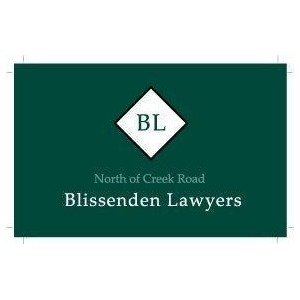Best Housing, Construction & Development Lawyers in Moonah
Share your needs with us, get contacted by law firms.
Free. Takes 2 min.
Free Guide to Hiring a Real Estate Lawyer
List of the best lawyers in Moonah, Australia
About Housing, Construction & Development Law in Moonah, Australia:
The field of Housing, Construction & Development Law in Moonah, Australia, encompasses a range of legal matters related to land use, environmental issues, contractual issues, financing, planning permissions, and dispute resolution. Being part of Tasmania, Moonah adheres to both federal and state laws regulatory processes to ensure responsible development and justice in potential disputes.
Why You May Need a Lawyer:
There are many reasons why someone may need a lawyer in this field. For instance, if you're planning a large-scale construction project, you may require guidance on contract formation, obtaining necessary permissions, or managing potential obstacles. Also, being a homeowner, you may need legal help to understand your rights or deal with potential disputes. If you're investing in real estate, a lawyer can guide you through the complex legal procedures to mitigate risk. Lawyers can also assist in cases of environmental disputes, land use violations, or housing discrimination issues.
Local Laws Overview:
Tasmanian laws governing housing, construction, and development are primarily focused on environmental sustainability, land use compatibility, fairness in housing, and secure investment. There are specific laws for obtaining necessary planning permits and adhering to construction codes. In residential real estate transactions, full disclosure laws mandate agents and sellers to disclose known defects. Rental laws in Tasmania also protect tenants' rights, including providing habitable housing and the right to privacy. Besides, strong anti-discrimination laws prohibit unjustifiable treatment based on a number of grounds, including race, age, gender, and disability.
Frequently Asked Questions:
1. Can I avoid legal help when dealing with property contracts?
While it is legally possible to proceed without a lawyer in property transactions, it's not recommendable, particularly for substantial purchases or sales. Legal professionals ensure contracts are legally enforceable and protect your interests.
2. Am I responsible for obtaining planning permission for my property development?
Yes. It is your responsibility to obtain necessary planning permission from local councils. Failure to do so can result in significant penalties.
3. Can a landlord evict a tenant without any reason in Moonah?
No. In Tasmania, a landlord must provide a valid reason such as breach of lease agreement or property sale to terminate a lease.
4. Can I sue a contractor if they don't stick to the agreed project timeline?
Yes. If your contract provides for damages for delayed completion, you may be able to recover these from the contractor.
5. Can I challenge my council's decision if my planning application is denied?
Yes. If your planning application is denied, you have the right to appeal the decision within a certain timeframe.
Additional Resources:
To further understand Housing, Construction & Development laws, the Tasmanian Law Handbook provides comprehensive information on this. Consumer, Building, and Occupational Services Department (CBOS) can also be of help in housing, construction, and development law-related issues. For disputes, the Residential Tenancy Commissioner or the Tasmanian Civil and Administrative Tribunal (TCAT) can assist.
Next Steps:
If you need legal assistance in Housing, Construction & Development, consider reaching out to local legal firms that specialize in this area. They possess the skills, knowledge, and experience to guide you throughout the legal process. Prioritize scheduling a consultation where you can discuss your situation, and plan further accordingly.
Lawzana helps you find the best lawyers and law firms in Moonah through a curated and pre-screened list of qualified legal professionals. Our platform offers rankings and detailed profiles of attorneys and law firms, allowing you to compare based on practice areas, including Housing, Construction & Development, experience, and client feedback.
Each profile includes a description of the firm's areas of practice, client reviews, team members and partners, year of establishment, spoken languages, office locations, contact information, social media presence, and any published articles or resources. Most firms on our platform speak English and are experienced in both local and international legal matters.
Get a quote from top-rated law firms in Moonah, Australia — quickly, securely, and without unnecessary hassle.
Disclaimer:
The information provided on this page is for general informational purposes only and does not constitute legal advice. While we strive to ensure the accuracy and relevance of the content, legal information may change over time, and interpretations of the law can vary. You should always consult with a qualified legal professional for advice specific to your situation.
We disclaim all liability for actions taken or not taken based on the content of this page. If you believe any information is incorrect or outdated, please contact us, and we will review and update it where appropriate.








